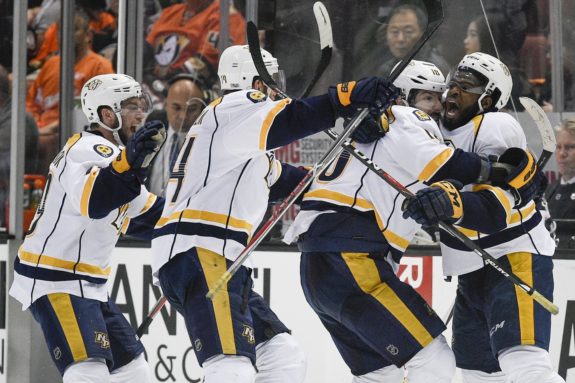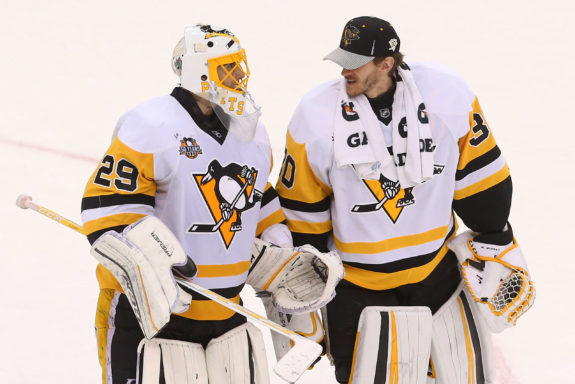Here at The Hockey Writers, we compiled predictions from our writers for the 2017 Stanley Cup Playoffs. Twenty-five of our writers contributed their predictions on the Stanley Cup Quarterfinals (Eastern Conference and Western Conference here). Then for the semifinals, 30 of our writers predicted which team would win each series (Eastern Conference and Western Conference here). Next, 39 of us looked to the Conference Final to establish who we thought would compete in this year’s Stanley Cup Final.
How Did We Do?
Starting with the Western Conference Final, 32 of us correctly predicted that the Nashville Predators would move on to their first Stanley Cup Final by defeating the Anaheim Ducks. Of the 32 of us that picked the Predators, 19 of us accurately thought the series would end in six games (Andrew Forbes, Dean Plunkett, Ed Sarno, Joe Cox, Pete Griffith, Tom Dianora, Shane Sander, Brandon Share-Cohen, Chad DeDominicis, David Beaudoin, Joe Ochs, Judson Rempel, Kenyon Clevenger, Mark Scheig, Ryan Pike, Ryan Wolfe, Jeff Seide, Jeff Yerger, and myself).
Also worth noting is how the Predators were viewed as such an underdog to start these playoffs. Only five of us (Josh Boulton, Trevor Connors, Matt Pryor, Ryan Szporer, and myself) believed the Predators would move past the Chicago Blackhawks to start these playoffs—although none of us anticipated a sweep.
As for the Eastern Conference Final, 30 of us selected the Pittsburgh Penguins to return to their second consecutive Stanley Cup Final. However, the majority of us believed this series would go six games. Only two of us thought this would go seven games (Jeff Seide and Jeff Yerger). In fact, both Jeff Seide and Jeff Yerger were the only two of the 39 of us to accurately predict both Conference Final matchups.
Stanley Cup Final Predictions
The 2017 Stanley Cup Final will consist of a matchup between the Central Division’s Nashville Predators and the Pittsburgh Penguins of the Metropolitan Division.
Our Stanley Cup Final predictions are from 37 of us here at The Hockey Writers (Aaron Schmidtke, Andrew Bet, Andrew Forbes, Brady Smith, Brandon Share-Cohen, Brian Anderson, Cam Hasbrouck, Chad DeDominicis, Chris Gere, Chris O’Reilly, Dave Holcomb, David Petrie, Dean Plunkett, Drew Johnson, Frank Fernandez, Hannah Bonnie, Jeff Hawkins, Jeff Seide, Jeff Yerger, Joe Ochs, Josh Boulton, Kelly Provost, Kenyon Clevenger, Larry Fisher, Louis Pannone, Mark Scheig, Matt Pryor, Pete Griffith, Ryan Pike, Ryan Wolfe, Scott Kline, Shane Sander, Thomas Conroy, Tom Dianora, Trevor Beggs, Will Billinghurst, and myself).
Nashville Predators vs. Pittsburgh Penguins
The Nashville Predators finished the season as the second wild card seed in the Western Conference with 94 points (41-29-12). As such, the Predators played up through their own Central Division starting with the first-seeded Chicago Blackhawks. The Predators started the playoffs by sweeping the Blackhawks. They moved on to play the second-place St.Louis Blues, who they defeated in six games. Lastly, the Predators faced the Anaheim Ducks, who finished first in the Pacific Division, in six-game series before qualifying for the Stanley Cup Final.
The Pittsburgh Penguins accumulated 111 points (50-21-11) in the regular season, which landed them in second place in the Metropolitan Division. The Penguins first matched up against the Columbus Blue Jackets, who they ousted in five games. Then the Penguins faced the Washington Capitals in the semifinals, which lasted seven games. In the Eastern Conference Final, the Penguins battled the Ottawa Senators in a seven-game series. After winning Game 7 in double overtime, the reigning Stanley Cup champions are looking for a repeat.

For the first time in Stanley Cup history, the final matchup will be between two American head coaches: Mike Sullivan of the Penguins and Peter Laviolette of the Predators. This will be Sullivan’s second appearance in the Stanley Cup Final. Last year was his first appearance and win. Laviolette is competing for the third time in the Stanley Cup Final. He won the Stanley Cup as the Carolina Hurricanes’ head coach in 2005-06 and returned to the Final in 2009-10 with the Philadelphia Flyers, but was ultimately unsuccessful.
2016-17 Regular Season
The Predators and Penguins met twice in the regular season, with each team winning once. The first game went to the Predators in Nashville, 5-1, on Oct. 22. In their rematch on Jan. 31, the Penguins won the game 4-2.
In analyzing this matchup, the offenses of the Penguins and Predators can be compared from the regular season. Overall, as a team, the Penguins had a very slight edge on the number of shot attempts they created in the time they played this season (58.75 to 58.61 Corsi-for per 60 [CF60]). Viktor Arvidsson led the Predators’ skaters with a 68.95 CF60, while Sidney Crosby led his team with a CF60 of 67.79.

More of the Penguins’ shot attempts translated to shots on goal, as depicted by their 33.34 shots for per 60 (SF60) compared to the Predators’ 31.41. Additionally, the Penguins created more scoring chances for themselves in the regular season (10.3 to 7.4 scoring chances for per 60 [SCF60]).
The Penguins’ offensive generation led to them having a higher expected goals for per 60 (xGF60) as well (2.72 to 2.33), which was also the best in the league. Crosby led his team with an xGF60 of 3.59, while Arvidsson led the Predators (2.88). Additionally, the Penguins had a league-leading goals for per 60 (2.87 that surpassed the Predators’ 2.47). Rookie Jake Guentzel led his team with a 4.01 goals for per 60 (GF60). For the Predators, Arvidsson led his team with a 3.47 GF60.
Crosby led the Penguins in the regular season with 89 points (44 goals, 45 assists). Following Crosby was Evgeni Malkin (72 points), Phil Kessel (70 points), and Conor Sheary (53 points). Justin Schultz ranked fifth in scoring with 51 points (12 goals, 39 assists), and led the defense. Kris Letang accumulated the second-highest point total (34 points) on defense.
Arvidsson had a breakout year this season, which ended with 61 points (31 goals, 30 assists) in 80 games, making him the leading scorer on the Predators in the regular season. Ryan Johansen also earned 61 points, but did that in 82 games. Behind Arvidsson and Johansen were Filip Forsberg (58 points), Roman Josi (40 points), and Mike Fisher (42 points). Josi led the defense with 49 points (12 goals, 37 assists). P.K. Subban earned the second-highest point total on defense (40 points), while Ryan Ellis trailed with 38 points.
After analyzing their offense, their defenses must be considered as well. The Predators were able to limit more shot attempts against (55.51 to 58.41 Corsi-against per 60). Subban’s low 50.52 Corsi-against per 60 (CA60) was the best on the Predators. Tom Sestito technically had the lowest CA60 on the Penguins of 51.78, but he only appeared in 13 games. Other than Sestito, Letang had the lowest CA60 of 53.6.
The Predators suppressed more shots than the Penguins, as evidenced by their 29.77 shots against per 60 (SA60) to the Penguins’ 31.54. In addition, the Predators allowed fewer scoring chances against—7.09 to 9.2 scoring chances against per 60 (SCA60).
Because of their defensive play, the Predators had a lower expected goals against per 60 (xGA60) than the Penguins (2.33 to 2.72). The Penguins’ 2.72 was the third worst in the league this season. Calle Jarnkork of the Predators had the most favorable xGA60 on his team of 1.94. Sestito had the lowest xGA60 on his team (1.96), and the next lowest was Tom Kuhnhackl’s 2.14. The Predators also had a lower goals against per 60 (GA60) than the Penguins (2.19 to 2.31).

The Penguins finished the regular season with the third-most successful power play (23.1 percent), while the Predators ranked 16th (18.9 percent). As for the penalty kill, the Predators’ was slightly better (80.9 percent) than the Penguins’ (79.8 percent).
Both teams are dealing with a number of injuries. The Penguins have been hampered by injuries throughout the playoffs. Letang did not participate in the playoffs at all this season, as he needed surgery to repair a herniated disk in his neck. Patric Honrqvist is a game-time decision for Game 1 because of an upper-body injury. Chad Ruhwedel has a concussion and Kuhnhackl has a lower body injury; it has not been established if either will be able to return for Game 1.
The Predators lost both Kevin Fiala (broken femur) and Johansen (acute compartment syndrome) in the postseason after having key roles in their playoff games. Fisher suffered a laceration near his eye but is likely to play Game 1. Craig Smith has a lower-body injury and it has not been determined if he will play.
2017 Stanley Cup Playoffs
The Stanley Cup Playoffs are sometimes referred to as a second season for teams and players. Therefore, it is important to not only look at their regular season accomplishments, but their playoff performances as well.

Starting again with their offensive generation, this data notes the Penguins’ first 13 games and Predators’ first 12 of the playoffs.
The Penguins’ offensive generation has been surprisingly low. Their CF60 in their first 13 games is the second-lowest of the playoffs (49.52), ahead of only the St. Louis Blues. The Predators is more favorable at 57.48.
Additionally, the Penguins have created fewer shots on goal (25.81 SF60, only ahead of the Boston Bruins’ 24.49). The Predators, on the other hand, have a higher 29.24 SF60. Although the Penguins have not created as many shot attempts nor shots on goal, they have been able to generate scoring chances. Their SCF60 of 7.52 only slightly trails the Predators’ 8.04.
The Predators also exceed the Penguins in xGF60 (2.46 and 2.28) and GF60 (2.61 to 2.48). The Predators’ 2.61 is the second-highest of the playoffs, trailing only the Ducks’, and the Penguins is fourth, behind the Blue Jackets.
The Penguins’ defense has not been as strong in the postseason either. They have allowed the most shot attempts against in the time they have played (highest CA60 of 68.27). The Predators have limited their shot attempts against, as demonstrated by their lower 55.07 CA60. The Penguins also have the highest SA60 of 34.85 in the postseason. Meanwhile, the Predators’ is more favorable at 29.24. Also, the Penguins’ xGA60 is higher than the Predators’ (2.83 to 2.27), as is their GA60 (2.48 to 1.61).

Thus far in the Penguins’ 19 playoff games, Malkin is their leading scorer with 24 points (seven goals, 17 assists). Behind Malkin are Crosby (20 points), Kessel (19 points), and Guentzel (16 points). Schultz is fifth in scoring with 10 points in 15 games and leads the defense, as he did in the regular season. Maatta follows Schultz on defense with seven points.
As for the Predators, Forsberg is their leading scorer with 15 points (eight goals, seven assists) in their 16 playoff games. Johansen collected 13 points in the 14 games he played. Ellis has earned 11 points, while Colton Sissons, Arvidsson, and P.K. Subban have each scored 10 points.
So far in the playoffs, the Predators’ power play is operating at 14.9 percent, while the Penguins’ is at 25 percent. However, the Predators’ penalty kill has been more successful (88.1 percent) than the Penguins’ (85.5 percent).
Goaltending
Pekka Rinne of the Predators appeared in 61 regular season games, going 31-19-9 with a .918 save percentage and a 2.42 goals-against average. At five-on-five his save percentage was .929 and he had a goals saved above average mark of 5.3.
Rookie Matt Murray was the starter for the Penguins this year after helping the Penguins to the 2016 Stanley Cup. He appeared in 49 regular season games this year (32-10-4) and earned a .923 save percentage and 2.41 goals-against average. At five-on-five he had a save percentage of .934 and 23.14 goals saved above average.

Marc-Andre Fleury, who was relegated to playing backup this year, appeared in 38 regular season games (18-10-7). In those games, he accumulated a save percentage of .909 and a goals-against average of 3.02 in all situations. During the regular season at five-on-five, his save percentage was .917 and his goals saved above average was 4.27.
In the playoffs, Rinne leads all goaltender with 12 wins. In all situations, he has earned a .941 save percentage and 1.70 goals-against average. Fleury started the playoffs for the Penguins, since Murray was injured in warmups prior to Game 1. Fleury played 15 games before being pulled in Game 3 against the Senators, which is when his postseason stalled. Fleury’s .924 save percentage and 2.56 goals-against average in all situations helped the Penguins make it to the Eastern Conference Final. In the five games Murray has appeared in, he has earned a .946 save percentage and a 1.35 goals-against average.
Our Predictions
In our Conference Final predictions, we accurately picked the Predators and Penguins to move on to the Stanley Cup. Now, we have to decide whether the Predators will hoist the Stanley Cup for the first time in franchise history or if the Penguins will extend their Stanley Cup reign for another season.
With all of that considered, 22 of us believe the Predators will win their first Stanley Cup, while the remaining of us believe in the Penguins. The prediction that received the most support was the Predators winning in six games (which had 15 voters). If the Penguins were to win, our predictions were equally torn between six and seven games (seven votes each).
*All five-on-five data sourced from Corsica.hockey.
